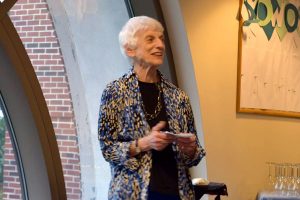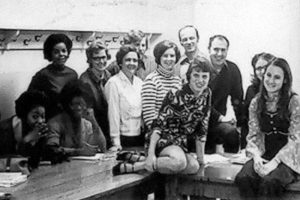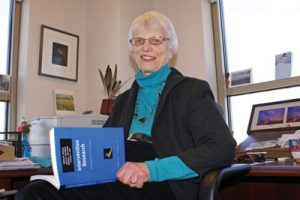
Maeda Galinsky, Ph.D., a distinguished professor who spent more than 50 years at the University of North Carolina at Chapel Hill as a social work scholar, researcher, teacher and mentor, has been inducted into the National Association of Social Workers (NASW) Social Work Pioneer Program.
Galinsky, who died Sept. 9, 2019, joins 20 other social workers from across the nation who recently earned the NASW distinction. Galinsky is the third UNC School of Social Work professor to be inducted into the pioneer program in recent years. Retired faculty members Iris Carlton-LaNey, Ph.D., and Hortense McClinton, MSW, were both honored as NASW social work pioneers in 2015.
The pioneer program was created to honor members of the social work profession who have contributed to the evolution and enrichment of the profession. The program identifies and recognizes individuals whose unique dedication, commitment and determination have improved social and human conditions. NASW social work pioneers are considered role models for future generations of social workers.
From the NASW Pioneers Biography
Maeda J. Galinsky, Ph.D., MSW, was a distinguished and passionate scholar, researcher, teacher and mentor who inspired generations of social workers. In a career that spanned more than 50 years, Galinsky was a prolific researcher and collaborator known as a pioneer scholar for her work on groups and intervention research. Galinsky co-authored a paper that remains among the top three ever-cited publications in the journal Social Work Research. Galinsky’s influence on the field, especially on social work theory and practice with groups and intervention research, continues to be felt today. When the social work profession was split between people who believed practice was an art form not reducible to scientific inquiry and people who believed practice could be science-based, she bridged the gap. Galinsky embodied both art and science, demonstrating that science and social work can be at once systematic and creative. She co-authored a book on intervention research, and many articles on developing manuals for social work practice. Galinsky was far ahead of her time in designing and developing social interventions. Although she was trained as a researcher and practitioner, when Galinsky first arrived at the University of North Carolina School of Social Work in 1965, research was practically nonexistent. Galinsky, in collaboration with colleague Janice Schopler, was undeterred and quickly began to pursue various pilot studies, most of which they funded out of their own pockets. Over the following decades, her work and publishing flourished, as did her reputation for being a critical thinker who embraced every opportunity to debate issues and ideas. Galinsky’s enthusiasm for and commitment to social work research and practice was the inspiration for her groundbreaking work in the 1990s when she and her colleagues began conducting experimental social work intervention studies. Galinsky was a national leader in groupwork, writing major texts and numerous articles on such topics as open-ended support groups and technology-based group processes. Galinsky was instrumental in developing group-based interventions to reduce aggressive behaviors in children and bolster resiliency in families including Making Choices, the first treatment manual ever published by NASW press. Galinsky repeatedly researched social justice and the constraints that condition the behavior of children, parents, and practitioners, including social workers, teachers, and counselors in this and all of her work. She was instrumental in the development of the doctoral program at the University of North Carolina at Chapel Hill School of Social Work. She believed that designing and developing interventions was foundational to social work.
Career Highlights

After receiving her MSW in 1961 with a focus on case work and group work, Galinsky went on to complete her Ph.D. in Social Work and Psychology in 1963 at the University of Michigan. She served there as a lecturer until joining the faculty of the University of North Carolina School of Social Work as an assistant professor in 1965. She was promoted to associate professor in 1967 and full professor in 1979 before being named Kenan Distinguished Professor in 1994, a title she held until she retired in 2015. During her long and distinguished career Galinsky’s research on group and social work interventions was funded by multiple foundations and state and federal agencies including the National Institutes of Health. Galinsky was the longest-serving member of the faculty and even after her retirement, she continued to mentor students, collaborate on research projects, and be an active participant in the university community. She published her final paper, an intervention to develop the social information processing of children, in 2016 at the age of 81. Prior to her death, Galinsky and her family established the Maeda and David Galinsky Scholarship Fund to provide crucial financial support to outstanding doctoral students within the School of Social Work at the University of North Carolina at Chapel Hill. This scholarship honors Galinsky’s legacy and the memory of her late husband David, a beloved and long-serving professor in UNC’s Department of Psychology.
Biographic Data
Galinsky was born in College Point in Queens, New York on December 12, 1934. She was a loving and devoted wife, a supportive mother, grandmother, sister, and an inspiring colleague, mentor, and friend. Valedictorian of her high school, Galinsky received her BA in Social Relations from Radcliffe College (part of Harvard College) in 1956 and her MSW (1961) and Ph.D. (1963) in Social Work and Psychology from the University of Michigan.
Galinsky was a scholar and a teacher, but also a woman with many hobbies. She imparted her love of the arts and love of nature to her children. She inspired everyone with her belief in the need for justice, the benefits of diversity, and the humanity in all people. Galinsky was actively invested in her students, serving as both their advocate and cheerleader. Her quick wit and wise perspective made her an important mentor and confidant to many.
Significant Achievements and Awards
Among her many accolades, including her distinguished professorship, were a Distinguished Alumni Award from the University of Michigan School of Social Work (1996) and multiple teaching awards. She served on the program committee for the Annual Symposium on Empirical Foundations from 1993-1997, chairing the committee in 1994. Galinsky served on the editorial boards of Social Work with Groups, Small Group Research, American Journal of Orthopsychiatry, and Social Work Research, and on the board of the International Association for Social Work with Groups. As a principal and/or co-principal investigator, she led multiple funded studies and published extensively.
Significant Publications

Galinsky published widely in the area of group work theory, practice, and research, including articles on support groups, open-ended groups, and evaluation of innovative interventions. Galinsky co-authored a paper that remains among the top three ever-cited publications in the journal Social Work Research. The papers produced by Galinsky and her coauthors for this publication, and Social Work, are too numerous to list comprehensively here. A few, additional publications are highlighted below:
- Sarri, R. C. & Galinsky, M. J. (1974). A conceptual framework for group development.
- Shopler, J. H. & Galinsky, M. J. (1981). When groups go wrong. Social Work, 26, 424-429. Shopler, J. H. & Galinsky, M. J. (1984).

